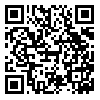Volume 17, Issue 2 (Summer 2025)
2025, 17(2): 94-103 |
Back to browse issues page
Ethics code: IR.NKUMS.REC.1397.023
Download citation:
BibTeX | RIS | EndNote | Medlars | ProCite | Reference Manager | RefWorks
Send citation to:



BibTeX | RIS | EndNote | Medlars | ProCite | Reference Manager | RefWorks
Send citation to:
Tavakoli Ghouchani H, Khorrami M, Kaviyani F, Asghari D. Experiences of Mothers of High School Students Regarding Virtual Education during COVID-19. North Khorasan University of Medical Sciences 2025; 17 (2) :94-103
URL: http://journal.nkums.ac.ir/article-1-3187-en.html
URL: http://journal.nkums.ac.ir/article-1-3187-en.html
1- Associate Professor, Addiction and Behavioral Sciences Research Center, North Khorasan University of Medical Sciences, Bojnurd, Iran
2- Ph.D. in Psychology, Addiction and Behavioral Sciences Research Center, North Khorasan University of Medical Sciences, Bojnurd, Iran
3- Ph.D. Student in Psychology, Addiction and Behavioral Sciences Research Center, North Khorasan University of Medical Sciences, Bojnurd, Iran ,faezeh_kaviyani@yahoo.com
4- Master Degree in Psychometrics, Addiction and Behavioral Sciences Research Center, North Khorasan University of Medical Sciences, Bojnurd, Iran
2- Ph.D. in Psychology, Addiction and Behavioral Sciences Research Center, North Khorasan University of Medical Sciences, Bojnurd, Iran
3- Ph.D. Student in Psychology, Addiction and Behavioral Sciences Research Center, North Khorasan University of Medical Sciences, Bojnurd, Iran ,
4- Master Degree in Psychometrics, Addiction and Behavioral Sciences Research Center, North Khorasan University of Medical Sciences, Bojnurd, Iran
Abstract: (1728 Views)
Introduction: Virtual education during the COVID-19 pandemic brought about extensive changes in the education and life of students and their families. Therefore, it is important to identify various experiences of E-learning to understand the problems and issues of different affected groups. The present study aimed to identify such experiences of mothers of first year Junior high school students.
Method: The present study was conducted with a qualitative approach and a content analysis method. The participants were mothers (n=14) whose children were receiving virtual education in their first year of Junior high school during the COVID-19 pandemic in 2021, in North Khorasan province, Iran. Purposive sampling continued until data saturation. To collect data, semi-structured interviews and note-taking were used. The interviews were recorded and implemented. Moreover, data analysis was performed based on Graneheim and Lundman's content analysis steps.
Results: The findings comprised three main themes: 1- the impact of virtual education on learning and teaching, 2- the impact of virtual education on students, 3- the impact of virtual education on the families. In this comparison, no code was found concerning the advantages and satisfactions of participants regarding the virtual education.
Conclusion: The experience of being a parent of students receiving virtual education during the COVID-19 pandemic shows that the effects of virtual education, especially at this level of education, can be wide in scope due to being accompanied by puberty experiences, mood swings, and emotional changes related to this stage of growth.
Method: The present study was conducted with a qualitative approach and a content analysis method. The participants were mothers (n=14) whose children were receiving virtual education in their first year of Junior high school during the COVID-19 pandemic in 2021, in North Khorasan province, Iran. Purposive sampling continued until data saturation. To collect data, semi-structured interviews and note-taking were used. The interviews were recorded and implemented. Moreover, data analysis was performed based on Graneheim and Lundman's content analysis steps.
Results: The findings comprised three main themes: 1- the impact of virtual education on learning and teaching, 2- the impact of virtual education on students, 3- the impact of virtual education on the families. In this comparison, no code was found concerning the advantages and satisfactions of participants regarding the virtual education.
Conclusion: The experience of being a parent of students receiving virtual education during the COVID-19 pandemic shows that the effects of virtual education, especially at this level of education, can be wide in scope due to being accompanied by puberty experiences, mood swings, and emotional changes related to this stage of growth.
Keywords: COVID-19 pandemic, High school students, Parents' experiences, Qualitative study, Virtual education
Type of Study: Orginal Research |
Subject:
Basic Sciences
Received: 2024/07/10 | Accepted: 2024/11/16 | Published: 2025/06/28
Received: 2024/07/10 | Accepted: 2024/11/16 | Published: 2025/06/28
Send email to the article author
| Rights and permissions | |
 |
This work is licensed under a Creative Commons Attribution-NonCommercial 4.0 International License. |







